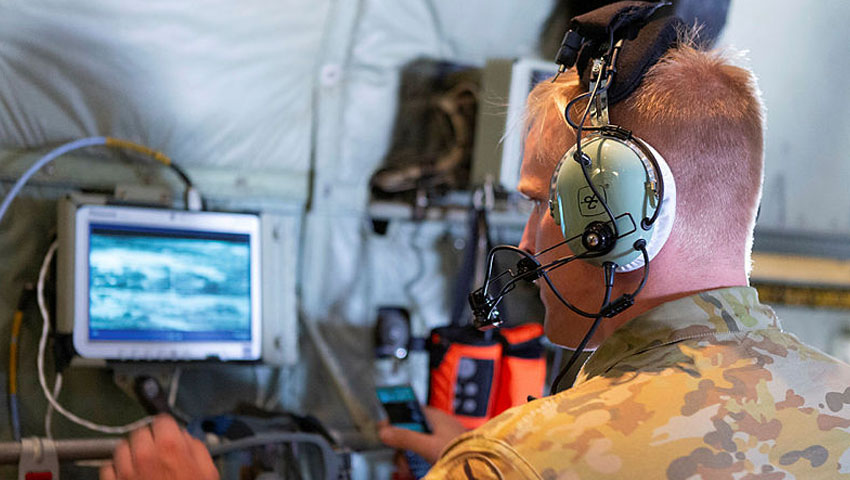A first-of-its kind trial by the Royal Australian Air Force to remotely pilot a small uninhabited aerial system (UAS) from the back of a C-130J Hercules has taken air-land integration to new heights.
To continue reading the rest of this article, please log in.
Create free account to get unlimited news articles and more!
Defence is saying the collaboration between Plan Jericho, 3SECFOR, 37 Squadron and Army has the potential to open up a range of capability options for the joint force.
The trial was recently undertaken at RAAF Edinburgh and tested the viability of operating a UAS via the aircraft’s onboard satellite communications (SATCOM) link. This has opened up future potential to operate UAS, or other networked capabilities, from anywhere in the world and, vice versa, demonstrating an ability to upload live imagery from offboard sensor systems.
Squadron Leader Peter Cunningham highlighted that this trial was the first time that airborne control UAS has been attempted from a C-130J Hercules.
“We used our wide-band SATCOM systems to provide a link to the UAS controller on the C-130J beyond the line of sight, and received video from the UAS throughout the flight,” SQNLDR Cunningham said.
Using 3SECFOR’s UAS capability together with the Air Mobility Innovation C-130J aircraft enabled the team to conduct the trial within a very short time frame.
“Working together with different skillsets and stakeholders such as 3SECFOR, Army and Plan Jericho has shown how we can be responsive to meet the needs of Air Force in pretty short order,” SQNLDR Cunningham said.
Corporal Mitchell Blight sees enormous potential for Army Commanders on the ground.
“With this sort of technology, we can see much further and be more distant from our targets, while still getting a comprehensive understanding of the ground in front of us through a streamlined information feed,” CPL Blight said.
Plan Jericho’s Advanced Sensors lead, Wing Commander Paul Hay, added, “While this is still in the proof of concept phase, we were very pleased to see how rapidly the team were able to get the unclassified concept off the ground in just two weeks.”
During the airborne operation, the team were also able to capture overarching video of the trial, using the Lightning sensor pod, which has recently been mounted on a pylon underneath the wing of the C-130J demonstrator.
This proof of concept further extends the connected sensor network, showing the potential to share greater amounts of information and improving decision making in the air and on the ground.
WGCDR Hay said that this trial demonstrated how bringing people together with different interests and capabilities, promoted ground-up innovation and new capabilities across the force.
Leading Aircraftman Rhys Mitting, 3SECFOR UAS operator provided advice to other airmen who have ideas that can improve Air Force.
“Be proactive, network with other units and you will find likeminded people who are willing to help,” LAC Mitting said.
“You need to be motivated, hardworking and you need to contact Jericho.”

 Login
Login







